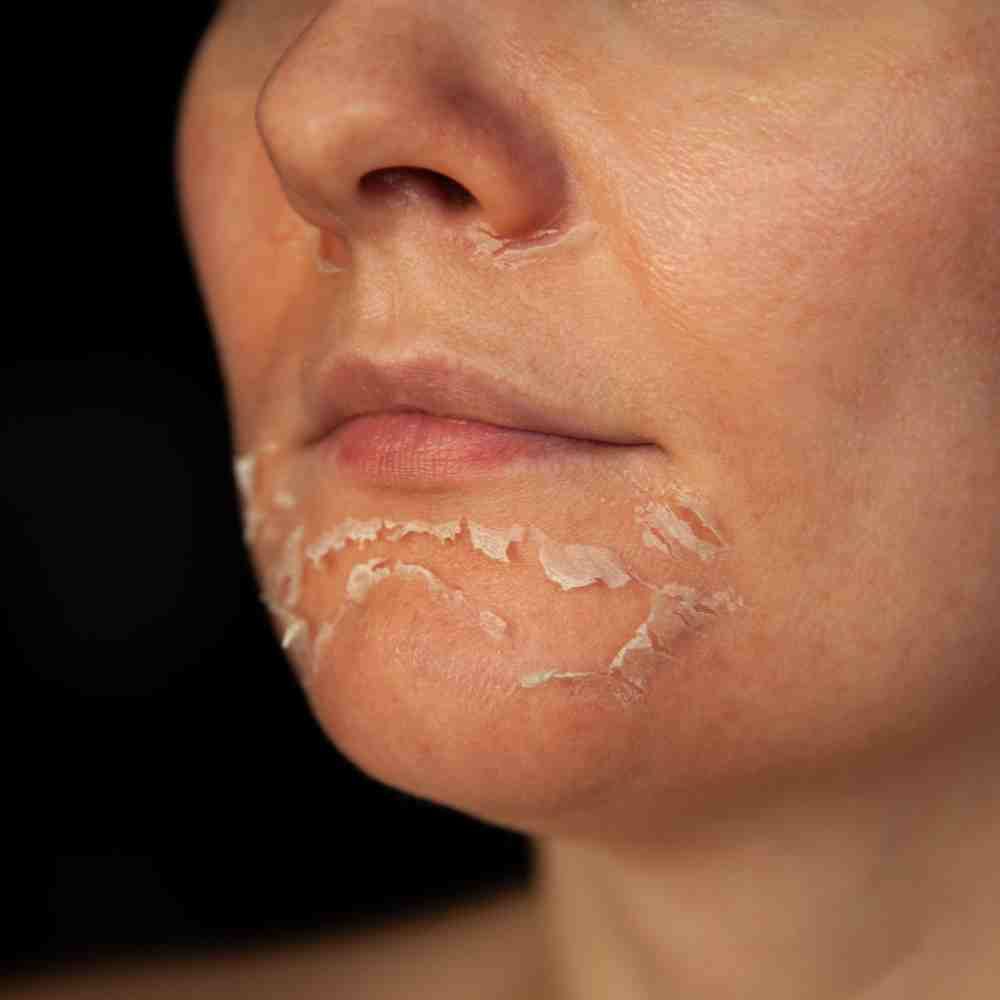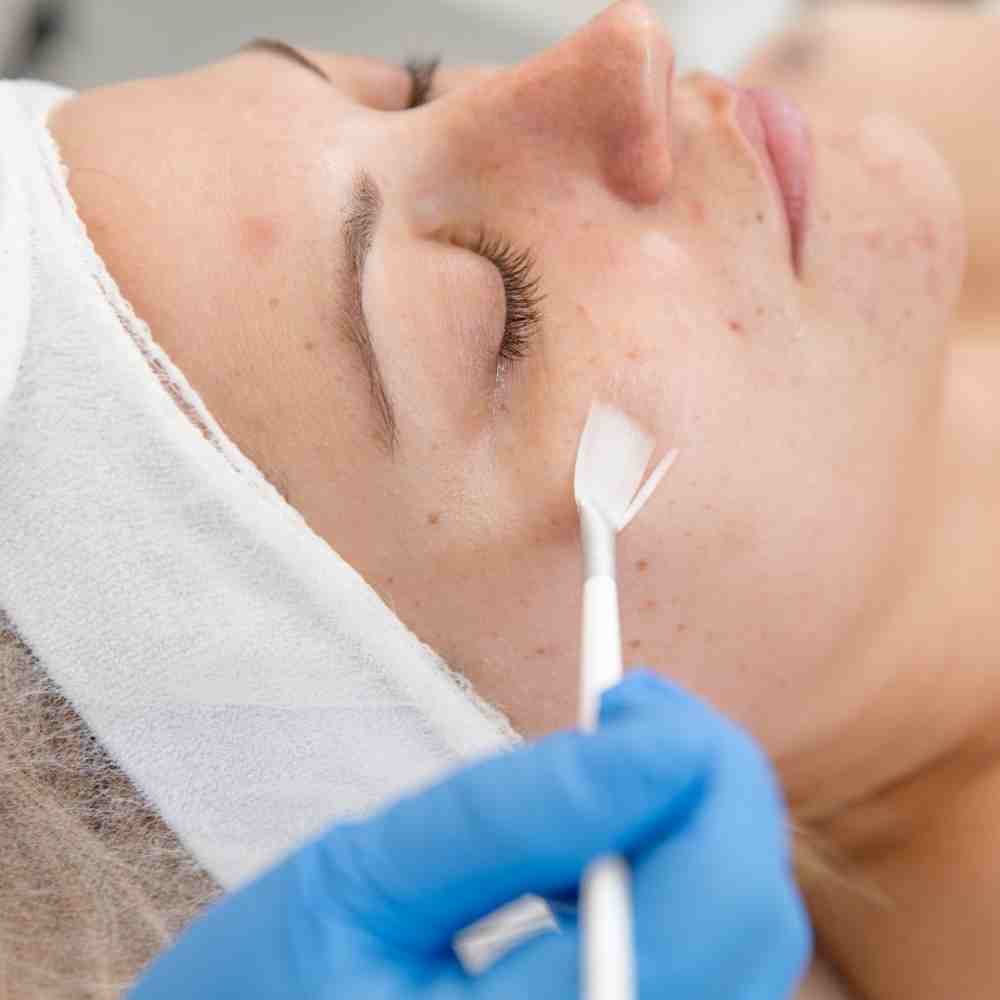
What Is a Phenol Peel & Is It As Dangerous As It Looks?
If you've seen pictures of a phenol peel on social media, it looks kind of…frightening.
The person undergoing the procedure has their face completely covered in an eerie mask of dead skin and there are usually some scary warnings about all the dangers. It may leave you wondering...who would sign up for this?!
Yet, if done correctly, a phenol peel treatment can be incredibly effective at treating problems like sun damage or acne scars. But just what is a phenol peel?
In this post, we’ll take a closer look at the procedure and everything that comes along with it to get you up to speed. So let's dive in and find out if it is as bad (or as scary) as it looks!
What are Phenol Peels?
A phenol peel is a deep chemical peel that utilizes phenol, a strong chemical solution, to remove damaged outer layers of the skin.
It is typically recommended for individuals with moderate to severe skin concerns such as deep wrinkles, sun damage, acne scars, and hyperpigmentation.
Phenol peels are often performed by trained dermatologists or plastic surgeons due to their intensity and potential risks.
Here is a before and after time lapse of this peel compliments of Dr. Dustin Portela. These photos demonstrate just how serious this procedure is.
@drdustinportela #duet with @drdustinportela @Clinicaharmonia amazing result #chemicalpeel #cosmeticdermatology #antiaging #phenolpeel
♬ original sound - Dr. Dustin Portela
The Benefits of Phenol Peels
There must be a reason people subject themselves to such a serious cosmetic procedure - amazing results? Here are just a few of the benefits people see after getting this deep chemical peel.
Significant Skin Rejuvenation
Phenol peels are known for their ability to deliver remarkable skin rejuvenation results.
By removing damaged layers of skin and stimulating collagen production, they can improve the appearance of deep wrinkles, fine lines, and uneven skin texture from acne.
Phenol peels can also address sun damage, including age spots and freckles, resulting in a more youthful and even complexion.
Enhanced Skin Tone and Texture
Phenol peels can be a glorious thing! They are potential allies in removing or reducing acne scars, dark spots, skin discoloration and hyperpigmentation. And who doesn't love smoother skin?
The deep exfoliation provided by the peel promotes the growth of new, healthier skin cells, resulting in a smoother and more even skin texture.
Long Lasting Results
Compared to milder chemical peels, phenol peels offer longer-lasting results. The deep exfoliation and collagen stimulation achieved through this procedure can lead to significant improvements in the skin's appearance that can endure for several years.
However, proper skincare maintenance and sun protection are essential for prolonging the results.
Safety Warnings & Potential Risks
While phenol peels can deliver dramatic results, they are an intensive procedure and carry potential risks. It is crucial to be aware of these safety considerations before opting for a phenol peel.
Dr. Anthony Youn shows a hardcore video of this peel being performed and warns of its side effects:
@doctoryoun Her skin is legit being lifted off her face! #phenolpeel #phenol #doctorreacts
♬ Succession (Main Title Theme) - Nicholas Britell
Here are even more cautionary warnings about this peel. Make sure you know the risks before considering getting this procedure for your own skin.
Deep Penetration & Downtime
Phenol peels penetrate deeper into the skin compared to milder peels, making the recovery period longer and more intense.
The treated skin will undergo significant exfoliation and may appear red, swollen, and crusty for several days to weeks.
It is important to follow the post-treatment instructions provided by your healthcare professional to ensure proper healing.
Discomfort During the Peel
Phenol peels can cause discomfort during the procedure due to the acidic nature of the solution. Local anesthesia or sedation may be used to minimize any potential discomfort.
It is important to discuss pain management options with your healthcare professional to ensure a comfortable experience.
Most patients are connected to a heart monitor during treatment because this procedure could even cause a fatal arrhythmia!
Potential for Hyperpigmentation & Hypopigmentation
In some cases, phenol peels can cause temporary or permanent changes in skin pigmentation.
Hyperpigmentation (darkening of the skin) or hypopigmentation (lightening of the skin) can occur, particularly in individuals with darker skin tones. Proper pre-treatment assessment and post-treatment care can help minimize the risk of pigmentary changes.
Sensitivity & Allergic Reactions
Individuals with sensitive skin or a history of allergic reactions should exercise caution when considering a phenol peel.
Be sure to discuss any allergies or history of seizures or heart problems with your doctor before subjecting yourself to this chemical peel.
Sun Sensitivity
After a phenol peel, the treated skin will be more sensitive to the sun. It is essential to protect the skin with broad-spectrum sunscreen, avoid prolonged sun exposure, and wear protective clothing to prevent sun damage and maximize the results of the procedure.
It's best to always wear a hat outdoors and you may even consider tinting the windows in your vehicle.
Consultation & Professional Guidance
Considering the potential risks and intensity of a phenol peel, it is crucial to consult with a qualified healthcare professional, such as a dermatologist or plastic surgeon trained to perform phenol peels before undergoing the procedure.
They will evaluate your skin type, medical history, and desired outcomes to determine if a phenol peel is suitable for you.
A thorough discussion about the potential risks, benefits, and expected outcomes will help you make an informed decision.

Is There a Safer Option?
Yes! You can consider a TCA peel instead. TCA peels are considered safer than phenol peels due to several factors.
Firstly, these types of peels offer a controlled depth of penetration, allowing healthcare professionals to adjust the concentration and application technique to target specific skin concerns without excessive damage. This reduces the risk of complications and unpredictable outcomes.
Additionally, TCA peels have a lower risk of pigmentation changes compared to phenol peels, minimizing the likelihood of hyperpigmentation or hypopigmentation.
And, these peels have a shorter phenol peel recovery time, typically ranging from a few days to a week, making them more manageable for individuals with busy schedules.
Lastly, TCA peels are suitable for various skin types, including darker skin tones, as their customizable nature allows for a tailored approach to minimize adverse effects.

The Risks & Rewards of Phenol Peels
Ultimately, phenol peels can offer dramatic skin transformation for anyone looking to revitalize their appearance.
With all potential risks and safety considerations however, it is essential to consult with a professional before engaging in such an intensive medical procedure.
Taking the time and effort to do your research and plan ahead can be the difference between achieving desired results or suffering any unwanted consequences.
The entire process should also be enjoyed as a positive experience - take it as an opportunity to revive your appearance!
Here's to hoping your renewed confidence will have you glowing both inside and out long after the peel is gone!

















